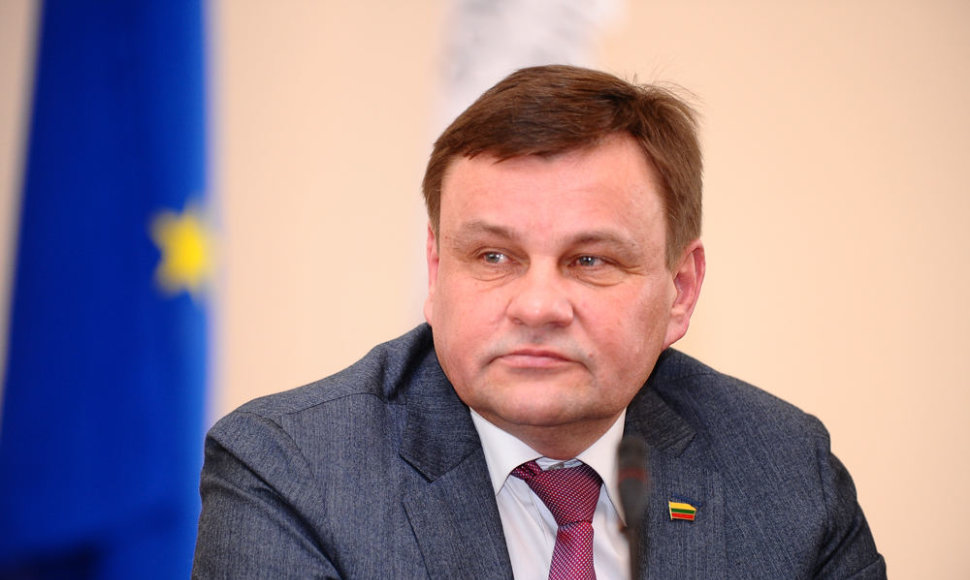Meanwhile, Prime Minister Algirdas Butkevičius said the society should be informed about such meetings.
"I just think that the meeting is overstated, it took place ten days ago, they asked for a meeting and we discussed nuclear energy. (...) The person was the vice-president in charge of Western and Ukrainian nuclear energy, and I said it was necessary to turn to the government and ask to set up a task force, which will submit a draft on May 15 on what we should do next with the nuclear power plant, and that was the end of the conversation," Gedvilas of the ruling Labor Party told journalists on Saturday.
He confirmed having met with Alexander Merten, vice-president of Rusatom Overseas, which is a subsidiary of Rosatom that builds nuclear power plants in the Russian Kaliningrad region and Belarus. MP Mindaugas Baštys, a member of the ruling Social Democratic Party, was also present at the meeting.
According to Rosatom's official website, Rusatom Overseas was established in 2011 to develop Russian nuclear technologies on the global market.
Asked about why the meeting was not announced, Gedvilas said it was an informal get-together.
"This is because it was an entirely informal meeting, we just wanted... The people – certain Seimas members – approached us, and the meeting took place. (…) MP Mindaugas Baštys, we spoke to him about it and there was the meeting, we didn't discuss anything else. I just recommended to go to the government and talk there," Gedvilas said.
He assured that the Rosatom representative spoke about the power plants under construction in the Russian Kaliningrad region and Belarus and inquired about "Lithuania's capabilities."
"We didn't talk about other things – it was brief, they said they would built nuclear facilities in Kaliningrad and Belarus and asked us about our capabilities, so I told them we were still discussing our nuclear future, I said the issues were discussed at the government, it was not the parliament's competence and I could not give them any answers as May 15 was still ahead, and the task force would decide on the path Lithuania will take," the parliamentary speaker said.
Asked whether he heard proposals from Rosatom for Lithuania to participate in joint projects, Gedvilas said he did not hear any propositions.
When journalists asked him whether he saw perspectives for Lithuania to participate in projects with Rosatom that is building two nuclear power plants close to Lithuania's borders, the Seimas speaker said he didn't see any perspectives.
"So far, I see no perspectives to work with Rosatom, we should just proceed with the work that we have planned and wait for May 15 and see what our task force has to say and then make certain decisions based on its conclusions. Maybe we won't even build the nuclear plant, as our society has said that we didn't need the nuclear plant, we may have to listen to the people's voice," Gedvilas said.
Meanwhile, Gedvilas said to TV3 news on Friday evening that the meeting with Rosatom addressed possibilities for the company to participate in Visaginas Nuclear Power Plant project.
"The need to discuss it was addressed but there was no direct proposal or anything. I think all perspectives should be considered, they will meet with the prime minister shortly to discuss all the perspectives, they have already spoken in Estonia and Latvia, they do not want to participate in the initial design phase with us, so there may be some other options," the parliamentary speaker said.
Asked on Saturday about what he meant by speaking about Estonia's and Latvia's unwillingness to participate in design work, he replied: "I had meetings with Latvian and Estonian prime ministers, parliamentary speakers and presidents. We spoke that both Latvia and Estonia could participate in the development of the nuclear project with Lithuania from the very beginning. We understand well that all design work will cost about 700 million litas (EUR 202.9m) and the costs would have to be covered by Lithuania alone. Afterwards, the Estonian and Latvian presidents and prime ministers said they would wait until we calculate all design work and the economic effect before deciding on whether they want to join the construction of the nuclear plant."
The Lithuanian prime minister, Butkevičius, said in comment of the unannounced meeting with Rosatom representatives that conversations were not forbidden but had to be made known to the public.
"He may want to meet but this has to be public, and I think that the conversations can take place. The government's position is clear, there is a strategy in place, I think there is no need to mess around," Butkevičius, the leader of the Social Democratic Party, told journalists on Saturday.
Asked about his opinion about the fact that the Rosatom meeting with the parliamentary speaker was organized by Social Democratic MP Mindaugas Baštys, the prime minister said the question should be addressed to the MP.
"I believe a number of parliamentarians were approached over the Rosatom CEO's wish to organize the meeting. I was familiar with the information but the meetings should be announced and included into the agenda, with a subsequent public comment on what was discussed," the prime minister said.
Lithuania's earlier Conservative government intended to build the new nuclear power plant in cooperation with Japan's Hitachi corporation, however, the Social Democratic Party came to power and said they would object the project until they are fully convinced it would pay off.
Russia has on a few occasions suggested that Lithuania should join the Kaliningrad nuclear plant project, however, Lithuanian leaders have been rejecting the proposals.












